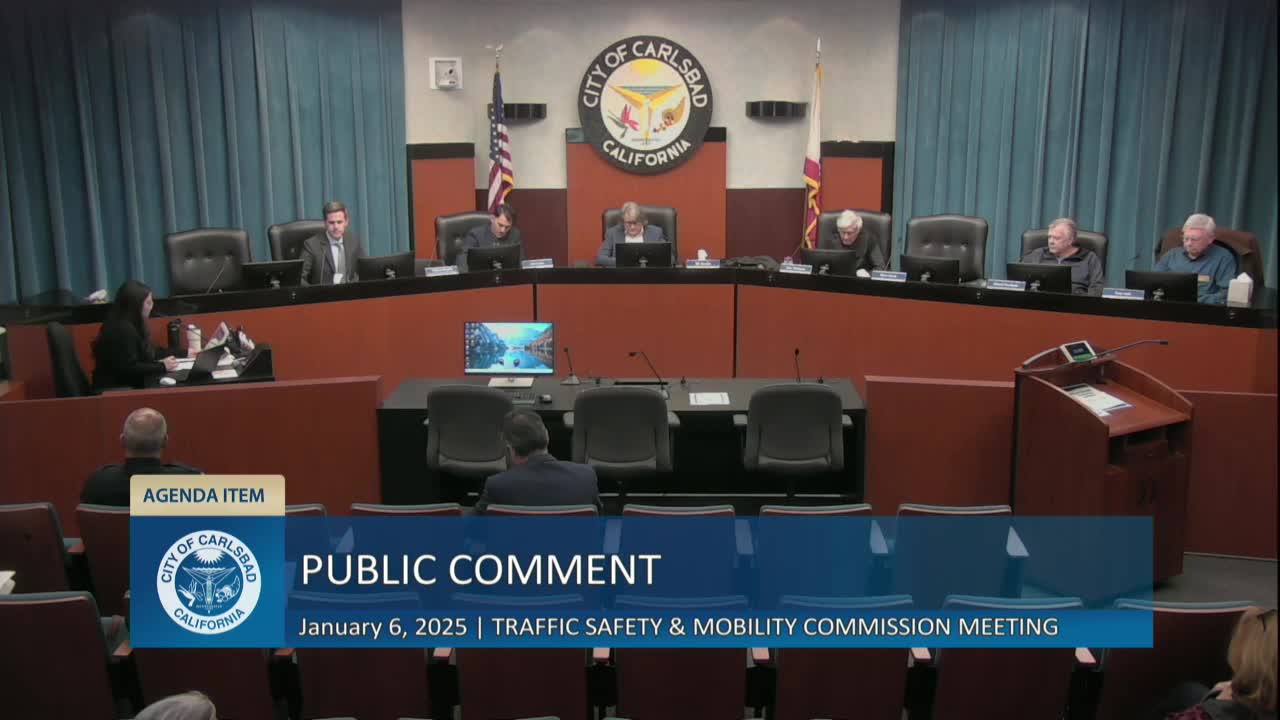Traffic commission recommends against one-block overnight parking ban on Garfield Street, urges citywide approach
Get AI-powered insights, summaries, and transcripts
Subscribe
Summary
After months of complaints about people living in vehicles and related sanitation issues on Garfield Street, the Traffic Safety and Mobility Commission voted to oppose a one-block overnight parking ordinance and asked city staff and council to pursue a broader, citywide solution and study designated safe parking.
The Carlsbad Traffic Safety and Mobility Commission voted Jan. 6 to recommend against adding an overnight parking ban limited to one section of Garfield Street and instead asked the City Council to pursue a broader strategy addressing overnight vehicle parking across the city.
The commission considered a proposed ordinance to add a new municipal code section restricting overnight parking on both sides of Garfield Street from the 26100 block to the 20100 block between 11 p.m. and 5 a.m. Lieutenant Dave Velasco of the Carlsbad Police Department presented staff findings, including community feedback, calls for service and a fiscal estimate for signage.
The commission’s recommendation came after about a dozen public speakers described both the neighborhood impacts and the needs of people living in vehicles. Resident Laurie Robbins pressed the commission to act on sanitation and safety in the area, saying, “Please don’t wait for an accident to happen. Install stop signs at the intersection of Grand and Madison.” Other nearby residents asked the city to pursue a citywide response rather than restricting a single block; Pat Connolly told commissioners the proposed change “is only squeezing this down here” and urged a broader plan. Several people experiencing vehicular homelessness described why they use Garfield Street and urged compassionate alternatives. One speaker who identified herself only as Michelle said, “I have never once had to call the police to come for anything I needed on Garfield Street.”
Velasco told commissioners staff had received about 80 calls for service in the area from January 2023 through September 2024; the calls included noise, suspected drug and alcohol use, loitering and unwanted-person complaints. He also said 18 of those calls were officer-initiated foot patrols or checks of suspicious vehicles. Staff noted community outreach, including a Dec. 17 meeting attended by roughly 30 people, showed no broad support for the single-block ban and surfaced alternatives such as resident permit parking, a citywide vehicle-sleeping ban, and a designated “safe parking” lot.
Staff estimated the cost to install overnight-parking signs for the Garfield segment and supporting materials and labor, as presented during the meeting. Commissioners discussed the risk that a one-block restriction would displace vehicles to adjacent streets without restrictions; staff cited prior restrictions on Armada and Surfside Lane that were followed by increased calls for service on nearby streets.
In discussion, commissioners split on approach. Several said a single-block ban would only shift the problem and favored directing staff to develop a comprehensive strategy. One commissioner proposed a six- or nine-month trial; others said a pilot would need clearly defined success metrics and that city council would ultimately have authority to enact trials. After debate, the commission voted to recommend Option 2 — do not amend the municipal code for Garfield Street — and asked staff to present City Council with a more holistic proposal that would include exploring a centrally designated overnight parking area and citywide options for overnight parking management. The motion carried; the meeting minutes record the recommendation and that the motion passed but do not list a roll-call vote tally.
The commission asked staff to return to council with additional options and to include a report summarizing community feedback and possible pilot criteria if council wants to consider a temporary test. Staff also noted enforcement practice: overnight parking violations would be treated as parking citations (not criminal arrests), with officers offering resources and outreach to people in vehicles when encountered.
The commission’s recommendation will be included in the staff report to City Council for their decision. The commission did not adopt the proposed municipal-code language itself. The record from the meeting shows strong public interest in a solution that couples enforcement with service referrals and alternatives such as designated safe parking or permit programs.
